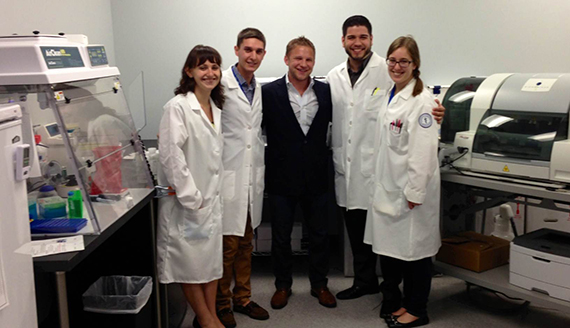
The Department of Genetics and Molecular Diagnostics: (left to right) Katya Geltser ’12, Joe Spina ’14, Nick Mitilenes ’10, Alejandro Amador, and Ellen Hill ’13
şÚÁĎÍř students, who interned this summer at companies such as NBCUniversal, Hukkster, Nike, and Facebook, are sharing their experiences. This post is written by Joseph Spina ’14, who spent his summer with MedLabs Diagnostics.
This summer, I had the pleasure of interning as a lab assistant and technician in the Department of Genetics and Molecular Diagnostics at MedLabs Diagnostics in Cedar Knolls, NJ. MedLabs is the oldest privately owned clinical lab in New Jersey and serves about 1,000 patients per day from a four-state area.
Working alongside Ellen Hill ’13 and under the supervision of Katya Geltser ’12, I was responsible for running tests throughout the entire genetics and molecular diagnostic laboratories, outputting more than 100 results per day.
My time was split between running diagnostics and assisting with validation protocols for the machinery we were bringing into MedLabs Genetics, an up-and-coming reference lab that was recently founded by Nick Mitilenes ’10, senior vice president and CTO of MedLabs Diagnostics. Every new test we bring into the lab must undergo a validation — a stringent process to ensure accuracy and consistency in our laboratory environment — before we can use it clinically.
Much of our volume in the molecular lab is focused on women’s health. HPV High Risk Screen is our most popular test, but we also test for chlamydia, gonorrhea, strep infections, blood clotting factors, and Lyme disease, among other conditions.
The department focuses on diagnostics using sensitive detection methods that involve amplification of DNA and RNA. The automation of processes such as DNA or RNA extraction and the analysis of amplified products using advanced approaches like gold nanotechnology allow us to provide rapid, non-manually intensive results that are incredibly reliable.
I also had the opportunity to conduct clinical research. Because large biotech companies have little to no access to patient samples, they rely on diagnostic labs to supply volumes of specimens for their studies. One such study will soon be published in the Journal of Molecular Diagnostics regarding control materials that we have found to be appropriate to use with one of our instruments.
Diagnostics is perhaps a less-explored field that presents an exciting option for students and alumni of the natural science programs at şÚÁĎÍř who are looking for opportunities outside of medical school, traditional research or academia.
Knowing that I played an integral part in real-world patient care by using such cutting-edge equipment — all the while connecting with a highly motivated group of colleagues — I found my summer experience to be incredibly rewarding.
— Joe Spina ’14 (Utica, NY)